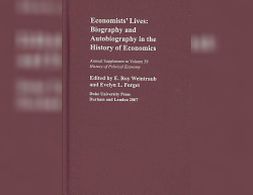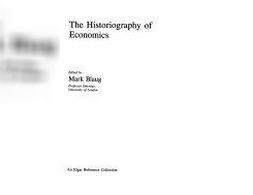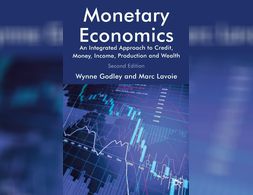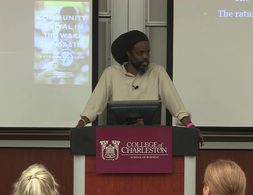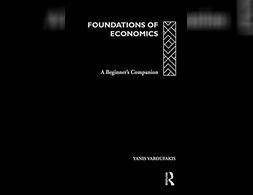✕
188 results
Within the heterodox field one of the most active topics is related to the theory of economic growth and distribution This is a textbook for advance undergraduate and graduate students Throughout its 18 chapters Classical Neoclassical and post Keynesian models are developed Each chapter contains study problems and suggested readings …
This book offers the first systematic analysis of economic thought concerning war.
Introduces four of the most influential economists you'll never read in a modern economics class - Marx, Veblen, Keynes, and Galbraith.
This reports presents empirical findings of research conducted by Michelle Holder, assistant professor of economics at John Jay College, City University of New York, with regard to the impact of what she terms a "double gap"- gender wage gap and ethnic minority wage gap - on the U.S. labour market.
The deceleration of world trade since 2011 has been widely discussed How much is due to a reversal of international production fragmentation And how much is due to decreasing demand for trade intensive goods The authors present a consistent framework that quantifies their relative importance A central concept in the …
In analyzing the global competition between Chinese and Indian tea, Andrew B. Liu challenges past economic histories premised on the technical “divergence” between the West and the Rest, arguing instead that seemingly traditional technologies and practices were central to modern capital accumulation across Asia.
The book’s central theme is to develop a new theory of speculative capital related to other forms of capital, the world market, and the state. Unlike most marxist and heterodox theories, the book distinguishes credit and fictitious capital from speculative capital to show its hegemony today in the capital markets.
This collection of essays, a supplement to History of Political Economy, brings together prominent scholars from economics, sociology, literature, and history to examine the role of biography and autobiography in the history of economics. The first of its kind, this volume looks at the relevance of first-person accounts to narrative histories of economics.
This course will expose students to some of the key debates that link digital transformations to economic, social, and political inequalities. Students will be familiarised with a variety of theoretical movements in development studies and internet studies: exploring thinking that frames the internet as a leveller that can bridge divides vs. exploring the internet as an infrastructure that amplifies existing inequalities.
Since the Middle Ages, literature has portrayed the economic world in poetry, drama, stories and novels. The complexity of human realities highlights crucial aspects of the economy. The nexus linking characters to their economic environment is central in a new genre, the "economic novel", that puts forth economic choices and events to narrate social behavior, individual desires, and even non-economic decisions.
Stratification economics is defined as a systemic and empirically grounded approach to addressing intergroup inequality. Stratification economics integrates economics, sociology and social psychology to distinctively analyze inequality across groups that are socially differentiated, be it by race, ethnicity, gender, caste, sexuality, religion or any other social differentiation.
This article reviews insights of existing literature on global care chains. A specific focus is laid on the impact that the refugee crisis has on global care chains and in turn how the crisis impacts the de-skilling of the women in the migrant workforce.
For many social critics "globalization" is a signpost of “late-capitalism” with the rise of multinational corporations, mass consumption and the multidirectional flows of capital, labor, media, communication, ideologies and social movements across national borders. Feminist analyses of globalization and the gendered and sexualized permutations of these phenomena offer a critical stance for theorizing these processes, and for studying their complex articulations across time and space.
Complexity economics and institutional economics are complementary approaches to studying the economy. They can pool their methods and foundational theories to explain the mechanisms that underlie economies.
This volume focuses on the importance of the history of economic thought as an intellectual discipline. It counters the arguments of some contemporary economists who describe it as studying the mistakes of the past. However, all the great economists - Smith, Ricardo, Marx, Marshall, Keynes and even Milton Friedman - have drawn on the history of economics to find an appropriate pedigree for their own theoretical innovations.
This book introduces 40 critical pointers for those who wish to see the theory in a broader, more realistic context. The material is suitable for introductory and intermediate courses and can be included selectively by students for additional reading or in lectures or tutorials as discussion points. "Students of mainstream economics need a guide like this to help them understand the underlying assumptions, limitations and inbuilt biases of what they are studying. It helps them open their eyes to a broader view of how real economies work."
This book challenges the mainstream paradigm, based on the inter-temporal optimisation of welfare by individual agents. It introduces a methodology for studying how institutions create flows of income, expenditure and production together with stocks of assets and liabilities, thereby determining how whole economies evolve through time.
Economic development is a process of continuous technological innovation and structural transformation. Development thinking is inherently tied to the quest for sustainable growth strategies. This book provides a neoclassical approach for studying the determinants of economic structure and its transformation and draws new insights for development policy.
In this talk, Virgil Henry Storr, a Research Associate Professor of Economics in the Department of Economics at George Mason University, talks about his research into to post-disaster recovery and the role that social entrepreneurship plays in rebuilding the communities and social networks that get disrupted, or entirely eliminated.
This lecture is all about the challenge to include heterodox approaches into macroeconomics. After giving an overview of recent approaches to that problem Professor Michael Roos presents the theoretical framework of Complexity Economics as a means to combine behavioral aspects with macroeconomics.
Richard Werner touches on a number of topics in this Odd Lots Podcast episode. As one of the pioneers when it comes to money and credit creation, he gives interesting insights into his early research on this topic. He then explains what he calls the “Quantity Theory of Credit” and is an alternative to the "Quantity Theory of Money".
This paper starts with an evaluation of three common arguments against pluralism in economics: (1) the claim that economics is already pluralist, (2) the argument that if there was the need for greater plurality, it would emerge on its own, and (3) the assertion that pluralism means ‘anything goes’ and is thus unscientific. Pluralist responses to all three arguments are summarized. The third argument is identified to relate to a greater challenge for pluralism: an epistemological trade-off between diversity and consensus that suggests moving from a discussion about ‘pros’ and ‘cons’ towards a discussion about the adequate degree of plurality. We instantiate the trade-off by showing how it originates from two main challenges: the need to derive adequate quality criteria for a pluralist economics, and the necessity to propose strategies that ensure the communication across different research programs. The paper concludes with some strategies to meet these challenges.
Marxian Political Economy focuses on the exploitation of labour by capital. The economy is not conceived as consisting of neutral transactions for exchange and cooperation, but instead as having developed historically out of asymmetric distributions of power, ideology and social conflicts.
When you notice inequality in your everyday life do you ever wonder where it comes from and what keeps it going This sociology course introduces you to core concepts of class gender and racial inequality and an approach to studying complex forms of inequality called intersectionality Featuring interviews with top …
Macroeconomics is fundamental to our understanding of how the world functions today. But too often our understanding is based on orthodox, dogmatic analysis.
Foundations of Economics breathes life into the discipline by linking key economic concepts with wider debates and issues. By bringing to light delightful mind-teasers, philosophical questions and intriguing politics in mainstream economics, it promises to enliven an otherwise dry course whilst inspiring students to do well.
Wealth inequality between Black and white people in the US barely has changed in the last 150 years. In her book "The Color of Money. Black Banks and the Racial Wealth Gap" Mehrsa Baradaran, analyzes why also Black banks have not successfully changed this and not enabled Black wealth on a broader scale.
The concern of this book is how to model time series statistically and there is emphasized the practical, applied aspects of statistical time series modeling. The author aims to provide methods that may be used to understand and analyze time series that accur in the “real world” that researchers face.
We use cookies on our website. Click on Accept to help us to make Exploring Economics constantly better!








